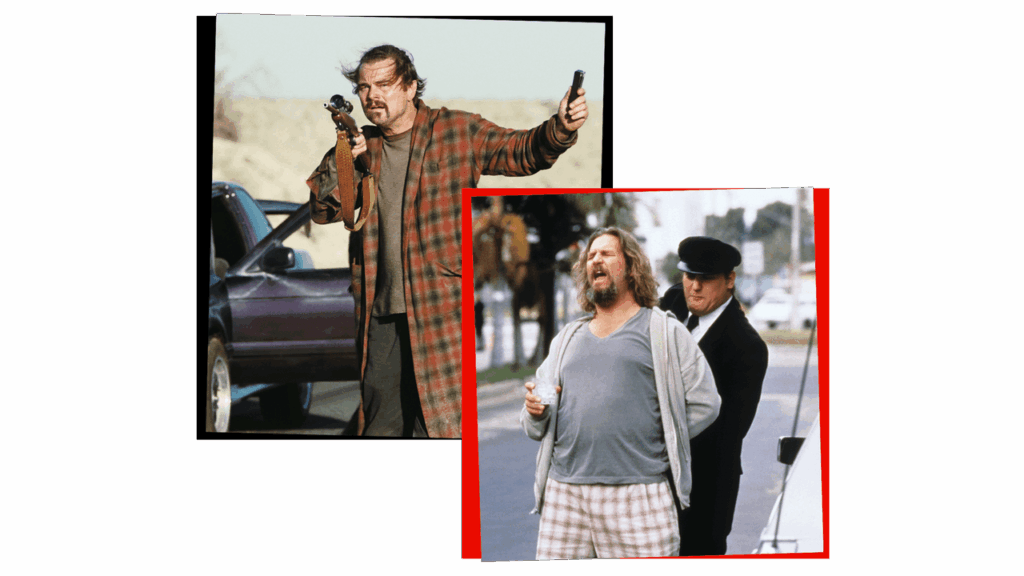A middle-aged man, wild-eyed and stoned, dives into a beat-up car and fumbles with the ignition, stomping the gas to a soundtrack of squealing tires as he slams the driver’s side door shut while already in motion. His chin-length hair is naturally wavy, or hasn’t seen the right side of a showerhead in a number of days, or maybe both. He’s wrapped in a bathrobe, indoor clothes in a decidedly outdoor environment, and he seems decidedly not up to the dangerous task at hand.
Am I describing Leonardo DiCaprio in the new Paul Thomas Anderson-directed One Battle After Another, or Jeff Bridges as the indelible The Dude in The Big Lebowski? Trick question—it’s both of them.
On the surface, the two movies, released more than a quarter-century apart, may not seem to share much DNA: In One Battle, DiCaprio plays Bob, an ex-revolutionary in hiding, forced off his shabby couch and into the line of fire for the sake of his teenage daughter. In Lebowski, Bridges as The Dude is first out to avenge his pissed-upon rug, then gets swept up, along with his bowling league buddies, in what science would categorize as absolute shenanigans. However, both movies trace the journeys of men (and their jaunty hair accessories) living outside of polite society, forced into action in pursuit of something they hold personally dear (when a rug ties the room together like that, that’s not something you should let go of without a fight), accompanied by an unlikely sidekick with a set of wheels and deep roots in spirituality (John Goodman’s Walter, begrudgingly driving on shabbos, which is certainly not what his buddies in Nam died for, and Benicio del Toro’s delightful Sensei Sergio, always ready with a few road beers and a few grounding words in times of crisis).
But beyond filmic similarities, perhaps Bridges’ career arc can act as something of a roadmap for DiCaprio, with The Dude and Bob, respectively, serving as iconic nexus roles for the two.
Please join me in welcoming Leo to his Dude Era, perhaps the first step to his installment as a respected elder statesman in the leading man club.DiCaprio is currently 50 years old. He’s been on our screens for decades: Just a year before The Big Lebowski’s release, his turn in Titanic had moviegoers the world over contemplating the measurements and buoyancy of wooden doors and experiencing swooning episodes when faced with grand staircases, no matter who was waiting at the top. He’s spent years as a certified leading man, doing the Suit Guy thing in Catch Me If You Can and The Aviator. With Inception, he added twisty psychological intrigue to the mix, pinned it to those lapels, and then in The Revenant he slept in a bear and finally got an Oscar.
Now, it’s time for a new phase of stardom, one with no trace of the Teen Beat heartthrob of yore. No matter what physical shape he’s in, DiCaprio’s characters now have a sense of slight psychic paunchiness, even if they don’t physically have a gut. They are wizened. They might be dads. They’re whiskery. They are, increasingly, at least a little bit unhinged, whether as Don’t Look Up’s astronomy professor-turned-political sellout or One Battle’s perpetually stoned ex-guerilla fighter, or, again…The Revenant.

